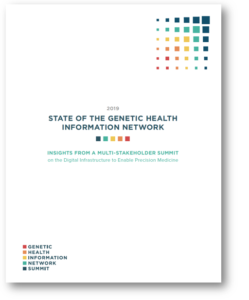
As genetics extends into clinical and consumer marketplaces, healthcare stakeholders face a growing set of challenges. In order to meet expectations and deliver on the promise of precision medicine, an effective cross-stakeholder information network for genetics is needed. Operationalizing such a network requires active collaboration.
At the most recent Genetic Health Information Network Summit, a group of leaders from across the healthcare ecosystem came together to discuss the shortcomings and potential improvements to the infrastructure connecting genetic information in healthcare. The group included health insurers, clinicians, hospital systems, researchers, policymakers, patient advocates, clinical laboratories, technology vendors, and drug developers. The following key themes emerged:
- Diagnostics is (still) a data business. Genetic data interoperability is vital, yet lacking.
- Security and privacy models are not sufficiently mature to enable clinical care, data sharing, and research.
- Gaps in genetic knowledge are widening between healthcare stakeholders. This mismatch is creating friction in the system.
- Patients and consumers want access to personalized care on their terms. This will require significant advances in system integration.
- As healthcare moves to valuebased care, the importance of genetics must be understood alongside other factors, such as social determinants of health.
The substance of this discussion was documented for this Whitepaper, which includes key implications important topics of discussion for the 2020 Genetic Health Information Network Summit (Sept 14-16, Nashville) and beyond.
